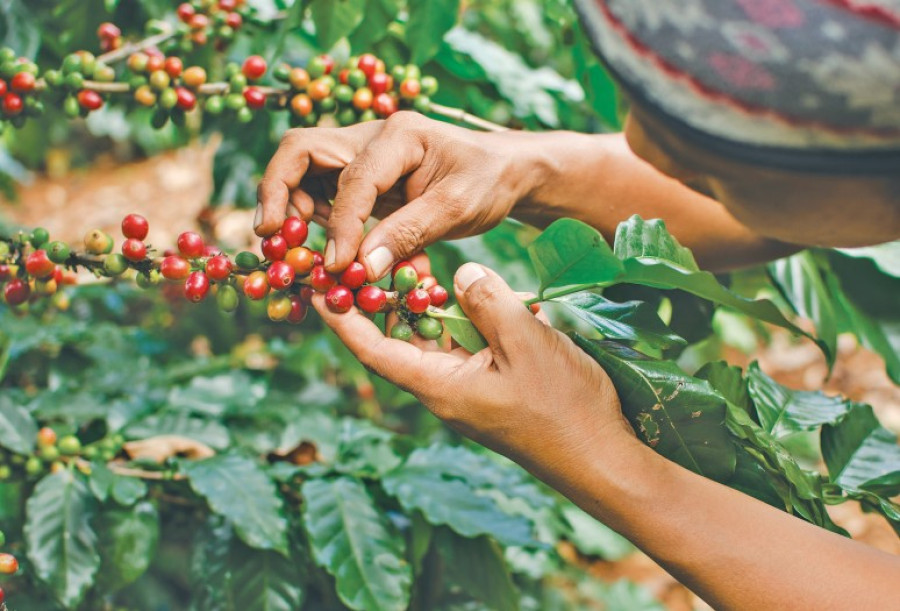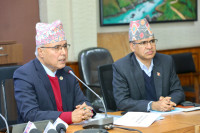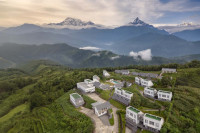Money
Nepali coffee prices rise on heels of increasing imports
Coffee imports jumped 155 percent to Rs325.86 million in the last fiscal year. Nepal imported 450.29 tonnes of coffee in the review period.
Krishana Prasain
The National Tea and Coffee Development Board has hiked the minimum support price for fresh cherry coffee and parchment beans by Rs5 to Rs30 per kg to help farmers facing high production costs.
The new rates came into effect on Friday.
Farmers now get Rs100 per kg for fresh cherry ‘A’ grade coffee, up by Rs5 per kg. ‘A’ grade coffee needs to be certified as organic and grown in 800 meters of height.
The price of fresh cherry ‘A’ was Rs50 per kg 10 years ago.
According to the board, the price of ‘B’ grade coffee has been fixed at Rs90 per kg, from Rs85 per kg earlier. ‘B’ grade fresh cherries do not require organic certification.
The support price for parchment ‘A’ grade coffee has been hiked by Rs25 per kg to Rs500 per kg.
The ‘B’ grade parchment coffee now costs Rs450 per kg, up by Rs30 per kg.
According to the board, ‘A’ grade parchment coffee needs organic certification and also contains 11 percent moisture.
Dried but unhulled coffee beans are known as parchment coffee.
The price of ‘A’ grade dry cherries dried in direct sunlight or through other processes with a moisture content of 11 percent has been fixed at Rs200 per kg, up by Rs30 per kg.
The minimum price of ‘B’ grade dry cherry has been fixed at Rs150 per kg, up by Rs35 per kg.
The minimum support prices are government-guaranteed prices for farmers' produce.
The support price is normally published at the beginning of the sowing or flowering season.
“The minimum support price for fresh cherries is fixed by taking into account the price sought by farmers and the actual cost of production. When the price of fresh cherries is increased, the price of all types of coffee increases automatically,” said Bishnu Bhattarai, executive director of the National Tea and Coffee Development Board.
As there is a gap between production and supply, and growing overseas demand for Nepali coffee, the minimum price has been raised to encourage farmers to produce more, said Bhattarai.
“The new prices will ensure farmers 20 percent profit,” said Bhattarai.
Coffee is one of Nepal’s niche products that can be well-marketed as an organic spice.
Demand for Nepali coffee is high in the country and abroad due to its organic content, good quality, taste and aroma as the beans are grown in the highlands with almost no exposure to pesticides.
According to the coffee-genotype DNA sequencing research report released by the EU-Nepal Trade and Investment Programme in January, Nepal is a Bourbon coffee country as most coffee in Nepal is organically grown.
The report recommended that Nepal diversify the genetic landscape to mitigate the risk of having a single uniform genetic background.
According to the board, coffee is being produced in 3,655 hectares. The area increased by over 300 hectares in the last fiscal year from the previous fiscal.
The country produced 394 tonnes of green coffee beans in the last fiscal year, up from 354.9 tonnes in the previous fiscal year 2021-22, according to the board.
As demand for coffee grows domestically and globally, farmers’ attraction towards cultivating it has increased, said Bhattarai.
The export of coffee increased by 11.40 percent to 77.86 tonnes worth Rs130.44 million in the last fiscal year ended in mid-July, compared to the same period in the previous fiscal year, the board said.
Coffee has been listed as one of the export commodities under the revised Nepal Trade Integrated Strategy, 2023 that came into implementation in the current fiscal year.
According to the board, Nepal is earning an average of $16 while exporting a kg of coffee. The country has exported nearly 20 percent of domestically produced coffee.
The rising demand from coffee lovers and the increase in the opening of coffee café outlets in the country swelled the demand for coffee domestically too, the board said.
But despite the export growth, coffee imports have risen sharply.
Coffee imports jumped 155 percent to Rs325.86 million in the last fiscal year compared to the previous fiscal year. Nepal imported 450.29 tonnes of coffee in the review period.
Gulmi, Palpa, Arghakhanchi, Lalitpur, Tanahun, Kavre, Sindhupalchok, Lamjung, Kaski, Gorkha, Syangja, Parvat and Baglung are the major coffee producing districts.




 20.12°C Kathmandu
20.12°C Kathmandu















